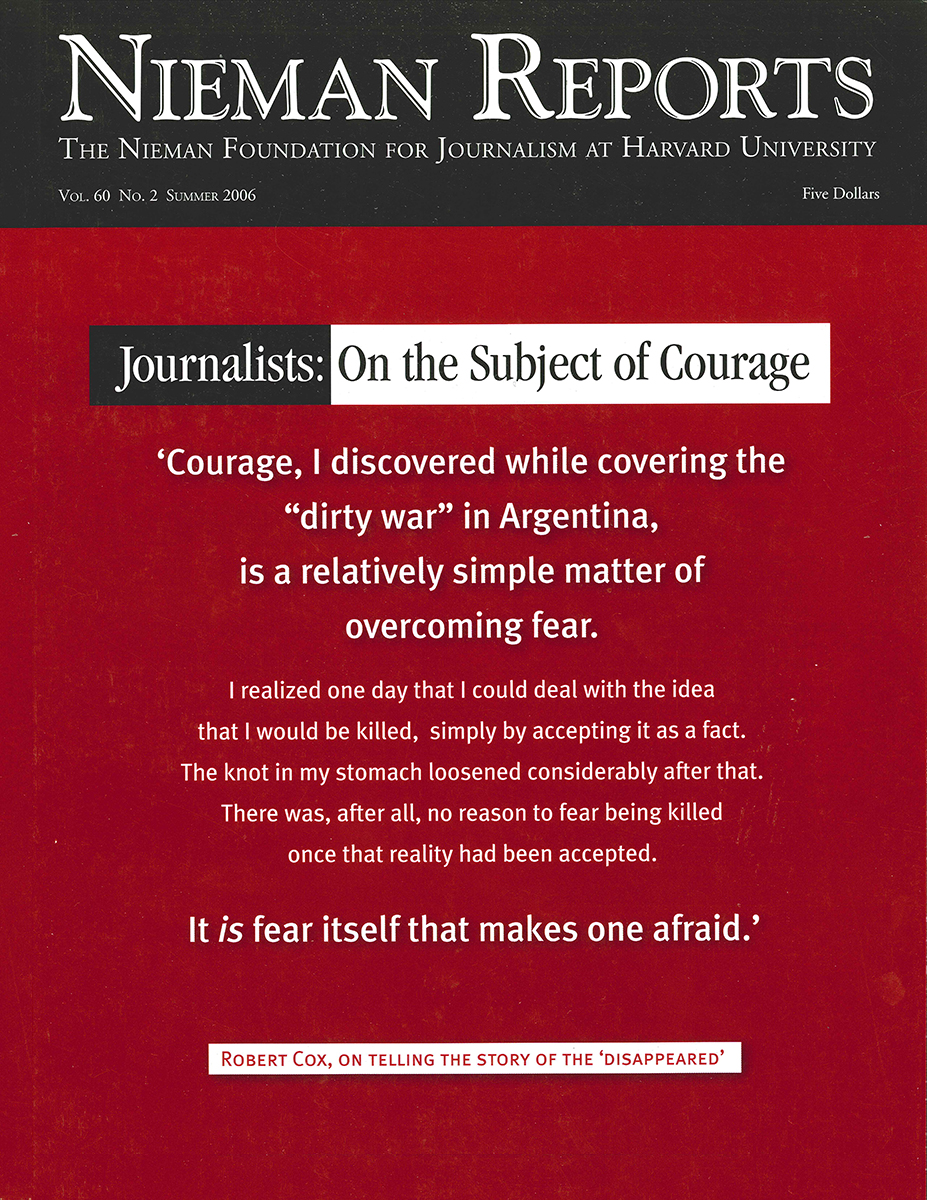Journalists Carmen Gurruchaga from Spain and Jineth Bedoya Lima from Colombia discovered a common bond in Santee Alley’s open-air market in downtown Los Angeles. In October 2001, while strolling through this market that offers everything from imitation Kate Spade handbags to pots and pans, these women discovered they are both tenacious shoppers. Exhibiting their world-class bargaining skills, they nimbly manipulated shopkeepers in their native Spanish — each taking hardheaded stands amid moments of shared laughter — and in no time at all were weighed down with purses, shoes, dresses and the additional luggage they needed to haul their purchases home.
RELATED WEB LINK
2001 Courage Award Winners
– International Women’s Media FoundationThat night each woman accepted a Courage in Journalism Award, given to her by the International Women’s Media Foundation (IWMF) for exhibiting journalistic tenacity. Gurruchaga spoke of her reporting on the ETA, an often violent and armed Basque nationalist organization, and recounted how members of the ETA had bombed her apartment, sending her and her two young sons scrambling from shards of glass. Bedoya Lima relived her abduction by paramilitary forces, who tortured and gang-raped her before leaving her bound by the roadside.
What these brave women share is the ability to deny the reality of danger in RELATED ARTICLE
“Truth in the Crossfire”
– By Jineth Bedoya Limapursuing a larger goal. Intense and deeply committed to their work, I delighted in watching them also embrace together the joy they’d found that afternoon on Santee Alley.
Last month’s release of The Christian Science Monitor’s Jill Carroll after 82 days of captivity by gunmen in Iraq again fixed the spotlight on the risks journalists take in doing their jobs. Armed insurgents know that journalists make high-profile hostages who bring with them sustained public attention. With 73 journalists and 26 news media workers killed since the war in Iraq began, there can be no doubt of the dangers journalists face in covering this war.
Carroll’s release was justifiably and widely celebrated by journalism groups. Board members at IWMF, where I work, voted only two days before her release to award her its Courage in Journalism Award. In October, when she accepts it, she will join 50 other women who have been its recipients, all of whom have demonstrated extraordinary bravery in their pursuit of international news reporting.
For the courage these journalists display, they deserve a rightful spotlight. For some, whose daily work continues amid unrelenting danger, public recognition can offer a mantle of protection as it forces authoritarian governments and armed groups to be wary of targeting them. There are other journalists who prefer to stay out of the spotlight, who want only to continue their work without fanfare, contending that too much attention can hamper their ability to report. They display what I call quiet courage, a kind of tenacious bravery that can be lonely and very hazardous.
A Quiet Heroine
One journalist, a quiet heroine, works under an assumed name to protect her family, including her son. She faces repeated lawsuits because her digging is uncomfortable for government officials. For several years, she has been targeted for death by an armed group that has a particular fondness for killing journalists and a track record of making good on its threats. Not long ago she was again in court, defending a lawsuit that could land her in jail for years. When asked what help Western journalism organizations could provide her, she responded that we should remain silent. Too much public association with us would taint her and threaten her ability to remain in her country and continue reporting. She chooses to go it alone, relying on survival instincts honed through years of reporting risky stories.
Other journalists tell us that recognition would bring them too much attention in their newsrooms, where they battle to cover stories that go against the political grain in their countries and at their news organizations. They, too, ask to be passed over for awards.
There are still other journalists who carefully balance what recognition means to their work. For 15 years, Shahla Sherkat, founder and editorial director of Zanan in Tehran, has written about women living under Islamic fundamentalism. She walks a tightrope, carefully measuring the words and stories she can publish while pushing boundaries in her country. If she falters, she risks a prison sentence and closure of her magazine. For many years she refused public recognition of her work. Finally, last year she traveled to the United States to accept a Courage in Journalism Award. Each word she spoke while in this country was carefully calibrated to be sure she could return to Iran and her work.
For her, as for others unnamed, passion lies in the work, not its celebration. This brand of quiet courage is practiced while attention is focused elsewhere. It, too, must be honored.
Kathleen Currie is the deputy director of the International Women’s Media Foundation.


